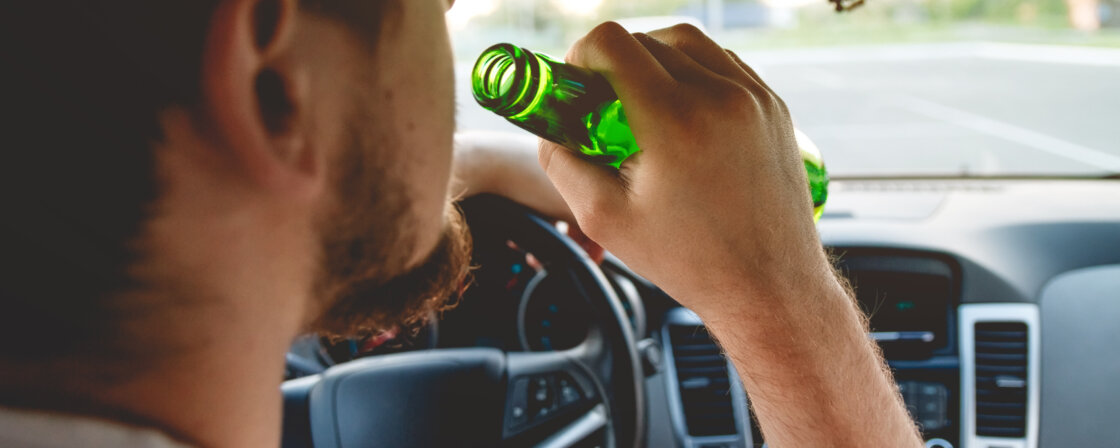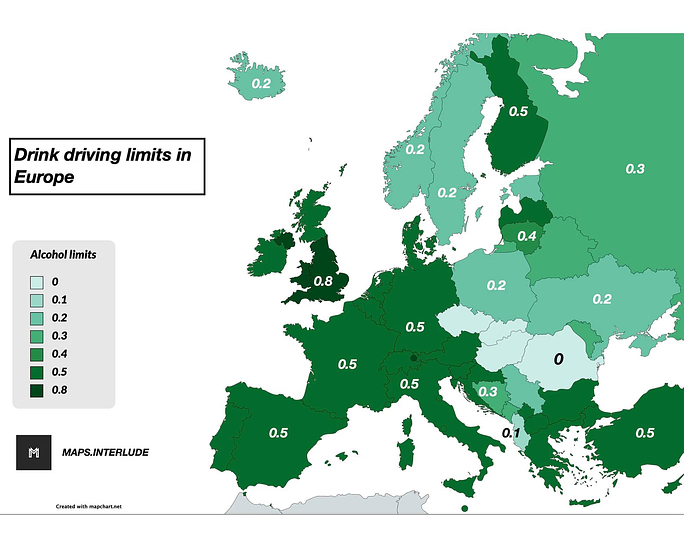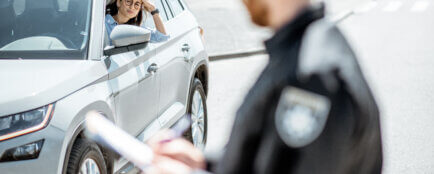In the Czech Republic, the Road Traffic Act stipulates zero tolerance of alcohol behind the wheel. This means that the driver must not have any alcohol in his or her blood, even during a routine roadside check.
How alcohol affects driving
Alcohol behind the wheel poses a significant risk that negatively affects both the driver’s physical abilities and mental functions. It slows down reactions, impairs coordination of movements and distorts judgement. Tasks that are normally completely automatic – steering the wheel, working the pedals or keeping a straight course – become much more difficult and imprecise under the influence. Every extra second can mean the difference between safe braking and an accident.
Alcohol also encourages unnecessary risk-taking and overestimation of your own abilities. It lowers inhibitions and leads to overconfidence. Drivers under the influence are more likely to take risks, for example, speeding unnecessarily, disregarding road signs or engaging in dangerous manoeuvres. The drowsiness and fatigue that alcohol consumption often causes is an equally serious problem. This leads to reduced concentration and, in extreme cases, to microsleep at the wheel.
In summary, alcohol and driving are incompatible. Even small amounts of alcohol can have a major impact on driving safety and endanger not only the driver but also other road users.
Are you solving a similar problem?
Have you received a ticket or summons?
The penalties can be high and it is not worth going through the process without consulting a lawyer. A lawyer can help you with the right arguments as well as with obtaining evidence. In some cases, they will ensure that your actions may not be considered an offence at all. In most cases, it will then be possible to get the penalties reduced.
I want to help
- When you order, you know what you will get and how much it will cost.
- We handle everything online or in person at one of our 6 offices.
- We handle 8 out of 10 requests within 2 working days.
- We have specialists for every field of law.
How many milliliters is one beer?
The average seventy-pound man can count on these values:
- a pint of ten = approx. 0.3 per mille
- a pint of twelve = approx. 0.4 per mille
- 2 dcl of wine = approx. 0.43 per mille
- a small shot of rum (40%) = approx. 0.12 per mille
- large shot = approx. 0.27 per mille
Four beers and three large shots already means over 2.5 per mille and it will take 17 hours to break down. That’s why even so-called morning driving after a night out is risky.
How quickly alcohol is absorbed
Alcohol is absorbed into the bloodstream through the stomach and small intestine. Approximately 20% is absorbed in the stomach and 80% in the small intestine. After ingestion, alcohol reaches its maximum concentration in the blood in about 30-90 minutes. Thereafter, the blood alcohol level begins to decrease, which takes several hours, depending on the amount of alcohol consumed and other circumstances.
The rate of absorption depends on various factors. The biggest influence is the amount and type of food in the stomach and individual metabolic differences. In general, however, on average, alcohol is broken down at a rate of about 0.1-0.2 per hour.
Alcohol tolerance behind the wheel in the Czech Republic and worldwide
In the Czech Republic, there is zero tolerance for alcohol behind the wheel. This means that drivers must not have any alcohol in their blood. However, there is a buffer zone, which is set at 0.24 per mille. The blood alcohol measurement is not 100% and can be distorted.
The zero tolerance also applies in Slovakia, Hungary and Romania, for example. In Croatia or Germany, the limit is set at 0.5 per mille, except for novice and professional drivers. In the UK and Ireland, you can legally breathe up to 0.8% of a millilitre.
Breath test – what does the law say?
The Road Traffic Act makes a breath test compulsory at every roadside check, not just when alcohol is suspected. The first measurement is indicative, while the second – the so-called expert measurement – is carried out with a Dräger device with precise calibration. Its result has probative value.
If the device shows alcohol, the driver can request a blood test, which is even more reliable in terms of probative value.
Refusal of a breath test
If you do not want to take a breath test, you have the right to do so. However, this automatically means a penalty as it is an offence. You face a fine of between 25,000 and 70,000 crowns, six penalty points and a driving ban of up to three years in administrative proceedings.
What to do if you pass a breath test?
- Keep calm and cooperate with the police.
- If you are sure you have not been drinking, ask for a blood test.
- Ask for a copy of the test report.
- Verify that the device used has a valid calibration.
- Don’t refuse the test out of hand – the penalty for refusal is as severe as the DUI itself.
False positive breath test
It can happen that you breathe in even though you are 100% sure that you have not consumed any alcohol. This can be due to, for example, residual alcohol in the mouth (e.g. from medication or mouthwash), due to illness (e.g. in the case of diabetics) or a problem on the alcohol tester’s side.
In this case, you have the option of insisting on a blood alcohol test by your doctor. However, this does come with a few problems. Firstly, you will have to pay for the test yourself and secondly, the police officer is not obliged to take you back to your car.
What is the penalty for drink driving
The severity of the penalty depends on your blood alcohol level as follows:
- Up to 0.3 per mille: You can be fined between 7,000 and 25,000 crowns and banned from driving for 6 months to a year and a half.
- Between 0.3 and 1 per mille: You can get a fine of 7,000 to 25,000 crowns, 6 penalty points and a driving licence suspension for six months to a year and a half.
- Over 1 per mille: If you are over 1 per mille, you are committing the offence of driving under the influence of an addictive substance. This can result in a prison sentence of up to one year, a fine or a ban from driving. More severe penalties, specifically in the form of a prison sentence of between six months and three years, a fine or a ban on activity, can then be imposed if you have committed a traffic accident or if you have been drinking in the course of your occupation (especially driving a mass transit vehicle) or if you have committed the offence repeatedly.
Tip for article
Tip: Have you been charged with felony DUI? You will only succeed in court if your defense is bulletproof. We will conduct a careful analysis of your case and design a criminal defense procedure in which we will vigorously enforce your rights.
Compulsory liability and alcohol
If you cause a car accident under the influence of alcohol, the insurance company will reimburse the damage to the victim thanks to the compulsory liability insurance, but subsequently can recover this amount from you according to the law on motor vehicle liability insurance – it is a so-called recourse payment. At the same time, you can say goodbye to the compensation from the accident insurance.
Alcohol for cyclists and boaters
Finally, it is also worth remembering that alcohol does not belong behind the handlebars of a bicycle. In fact, there is a zero tolerance for cyclists too. Failure to do so can result in an administrative fine of between CZK 7,000 and CZK 25,000.
Riders on a non-powered craft have an advantage over cyclists in that they can enjoy a beer or two. The 0.5 per mille limit applies to them. However, this applies only to coxswains; other boaters are not restricted at all. An exception to the rule are certain high-risk sections (e.g. on the Elbe River from Přelouč to the state border), where alcohol is not tolerated at all.
Summary
Drink-driving in the Czech Republic is strictly regulated with zero tolerance, reflecting the serious risk that alcohol poses to road safety. Alcohol impairs reaction time, coordination, judgement and the ability to judge distances and speeds, which significantly increases the risk of road accidents. Penalties for drink driving increase with higher blood alcohol levels, with maximum penalties including imprisonment and heavy fines. The same strict rule applies to cyclists, while drivers have more lenient limits, but with exceptions for certain sections. It is important to note that insurance does not cover damages caused by a drunk driving accident, which means additional financial risk for drunk drivers.





